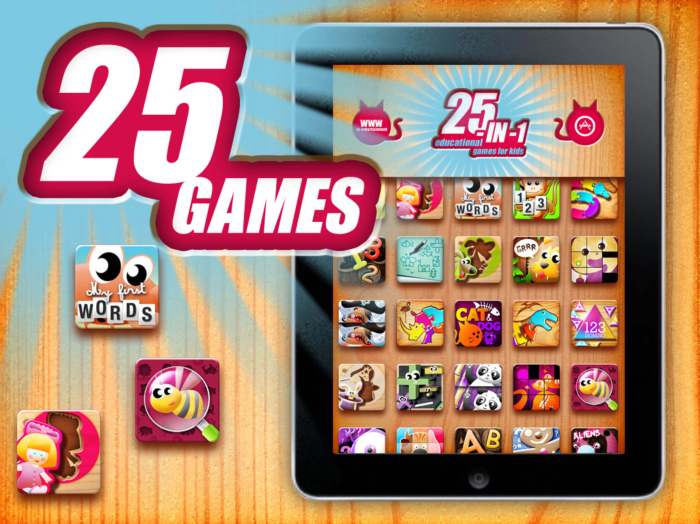
Educational games for kids sets the stage for this enthralling narrative, offering readers a glimpse into a story that is rich in detail and brimming with originality from the outset. These games not only entertain but also play a crucial role in enhancing children’s learning experiences, making complex concepts accessible and enjoyable. From board games to online platforms, there’s a plethora of options available that cater to diverse learning styles while promoting cognitive development.
In this exploration, we’ll delve into the various types of educational games, their benefits in fostering skills such as creativity and teamwork, and how they can be seamlessly integrated into both classroom settings and home environments. With the right approach, educational games can transform learning into an engaging adventure.
Types of Educational Games

Educational games for kids come in various forms, each designed to promote learning while ensuring that children have fun. From classic board games to modern online experiences, these games engage young minds and help develop essential skills. Each type of educational game offers unique benefits that contribute to cognitive, social, and emotional development.
Categories of Educational Games
Understanding the various categories of educational games can enhance how educators and parents choose the right tools for children’s learning. Below is a table that Artikels different types of educational games, highlighting their features and benefits.
| Type of Game | Description | Benefits |
|---|---|---|
| Board Games | Games played on a game board, often involving pieces that move according to dice rolls or card draws. | Enhances critical thinking, social interaction, and strategic planning. |
| Card Games | Games that use a deck of cards as the primary tool for gameplay, often involving memory and strategy. | Improves memory, math skills, and decision-making abilities. |
| Arcade and Coin-Op Games | Physically interactive games found in arcades, focusing on skill and reflexes. | Encourages hand-eye coordination and fine motor skills. |
| Online Games | Games played over the internet, often incorporating interactive elements and collaborative play. | Fosters teamwork, problem-solving, and digital literacy. |
| Roleplaying Games | Games where players assume the roles of characters in a fictional setting, often with narrative-driven gameplay. | Enhances creativity, empathy, and social skills through storytelling. |
| Video Games | Electronic games played on consoles or computers, incorporating various genres and gameplay styles. | Develops critical thinking, strategic planning, and adaptability. |
| Other Games | This includes puzzles, outdoor games, and activities that may not fit neatly into other categories. | Encourages physical activity, problem-solving, and collaboration. |
The diversity of educational games provides numerous avenues for learning. Board games and card games cultivate strategic thinking and social skills through interactive play. Arcade games enhance fine motor skills, while online games promote teamwork and digital engagement. Roleplaying games facilitate creativity and empathy, and video games encourage a blend of critical thinking and adaptability. Finally, other games, such as puzzles, provide unique problem-solving experiences that can be both engaging and educational.
Overall, integrating these games into children’s routines can significantly boost their learning journey.
Benefits of Educational Games
Educational games have become an essential part of learning for children, offering diverse advantages that extend beyond traditional teaching methods. By engaging with educational games, kids not only have fun but also develop critical skills that play a significant role in their overall growth and development. These games often blend learning with enjoyable activities, creating an effective way for children to absorb knowledge.
Cognitive Skills Developed Through Educational Games
Educational games are designed to stimulate various cognitive skills in children, enhancing their intellectual capabilities in a playful manner. These games help develop skills such as problem-solving, memory, and logical reasoning. Here are some key cognitive skills that educational games can nurture:
- Critical Thinking: Many educational games present challenges that require players to analyze situations and make decisions based on evidence. This fosters the ability to think critically and evaluate options.
- Memory Enhancement: Games that require memorization of facts or sequences can significantly improve a child’s memory retention, allowing for better learning outcomes in other subjects.
- Attention and Concentration: Engaging in games that require focus helps children enhance their attention span and concentration levels, which are crucial for academic success.
- Problem-Solving Skills: Games often involve puzzles or obstacles that need to be overcome, encouraging children to devise strategies and solutions, thereby improving their problem-solving abilities.
Social Skills and Teamwork Development
Educational games also serve as a platform for children to develop important social skills and teamwork. By playing games in a group setting, kids learn how to communicate effectively, share responsibilities, and collaborate towards common goals. The following aspects highlight how these games facilitate social interaction and teamwork:
- Collaboration: Many educational games require players to work together, fostering a sense of community and encouraging teamwork among peers.
- Communication Skills: Participating in group games helps children articulate their thoughts and ideas clearly, enhancing their verbal communication skills.
- Conflict Resolution: Through gameplay, children may encounter disagreements, providing them the opportunity to practice negotiating and resolving conflicts amicably.
- Empathy and Understanding: Engaging with diverse players allows children to develop empathy by understanding different perspectives and appreciating team dynamics.
Games That Enhance Creativity and Critical Thinking
Several educational games specifically target creativity and critical thinking, encouraging children to express their ideas and explore possibilities. These games often involve open-ended scenarios or imaginative play that requires innovative approaches. Here are a few examples:
- LEGO Building Kits: These kits promote creativity as children design and construct their own structures, encouraging innovative thinking and planning.
- Story Cubes: This game involves rolling dice with various images and using them to create stories, which enhances narrative skills and imaginative thinking.
- Math Blaster: A game that combines fun with math challenges, stimulating critical thinking and problem-solving skills through engaging gameplay.
- LittleBigPlanet: A video game that allows players to create their own levels and characters, fostering creativity and strategic thinking in a digital environment.
“Educational games are not just about learning; they are about developing a mindset that embraces creativity, collaboration, and critical thinking.”
Implementing Educational Games in Learning Environments

Incorporating educational games into learning environments can significantly enhance the educational experience for children. By strategically integrating these games into the curriculum, educators can foster engagement, motivation, and retention of knowledge among students. This section will Artikel a structured plan for implementing educational games, methods for assessing their effectiveness, and strategies for parents to support learning at home through these games.
Structured Plan for Incorporating Educational Games
Creating a well-organized plan to integrate educational games into the classroom is essential for maximizing their benefits. This plan should include the following steps:
1. Identify Educational Objectives
Determine the key learning goals that the games should support, ensuring alignment with curriculum standards.
2. Select Appropriate Games
Choose games that match the identified objectives and are suitable for the age group being taught. Ensure that they are engaging, relevant, and promote critical thinking.
3. Develop a Schedule
Integrate game sessions into the weekly lesson plans, balancing game time with traditional teaching methods for a blended approach.
4. Facilitate Game Sessions
Act as a guide during gameplay, providing support and encouragement. Encourage group collaboration and discussion to enhance learning.
5. Debrief and Reflect
After gameplay, conduct discussions to help students reflect on what they learned and how it applies to their studies.
Assessing the Effectiveness of Educational Games
To evaluate the impact of educational games on learning outcomes, several assessment methods can be employed. These methods include:
Pre-and Post-Tests
Administer tests before and after game play to measure knowledge gained.
Observational Assessments
During game sessions, observe student engagement, teamwork, and problem-solving skills to gather qualitative data.
Student Feedback
Collect feedback from students about their experiences and perceived learning from the games, which can provide valuable insights into their effectiveness.
Performance Tracking
Use ongoing assessments and tracking systems to monitor student progress and academic performance over time, correlating improvements with game usage.
Strategies for Parents to Utilize Educational Games at Home
Parents can play a vital role in supporting their children’s learning through educational games. Here are some effective strategies:
Create a Learning Space
Designate an area at home for game play that is conducive to concentration and free from distractions. This space should be comfortable and equipped with necessary materials.
Encourage Collaborative Play
Engage in games with children or encourage them to play with siblings or friends. This collaboration can enhance social skills and foster a sense of community.
Set Learning Goals
Establish clear learning objectives for game sessions at home, similar to what might be done in school. Discuss these goals with children to give them a sense of purpose.
Monitor Game Choices
Help children select games that are educational and appropriate for their age, ensuring a good mix of fun and learning.
Integrate Learning into Daily Life
Relate the concepts learned through games to real-life situations, helping children see the relevance of their learning outside the game environment.
Final Wrap-Up
In conclusion, educational games for kids present a powerful tool for enriching the learning process. Not only do they foster essential skills like critical thinking and collaboration, but they also create an enjoyable atmosphere for kids to thrive in. As we continue to understand the impact of play on education, embracing these games could lead to more innovative and effective learning strategies in both schools and homes.
Frequently Asked Questions
What age group is best suited for educational games?
Educational games can be tailored for various age groups, typically ranging from preschoolers to pre-teens, catering to their developmental needs.
Are educational games effective for all learning styles?
Yes, many educational games are designed to engage multiple learning styles, including visual, auditory, and kinesthetic learners.
Can parents incorporate educational games at home?
Absolutely! Parents can use educational games as fun learning tools to reinforce concepts taught in school and support their child’s education.
How do I choose the right educational game for my child?
Consider your child’s interests, age, and the skills you wish to develop. Look for games that align with educational objectives and are age-appropriate.
Do educational games affect social skills?
Yes, many educational games encourage teamwork and communication, helping children develop vital social skills while playing.




